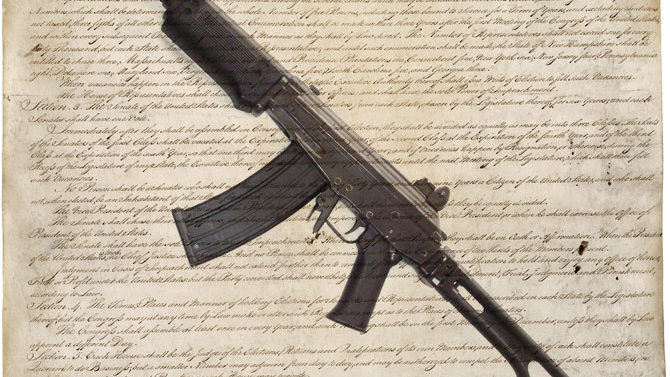A well regulated Militia, being necessary to the security of a free State, the right of the people to keep and bear Arms, shall not be infringed.—Second Amendment to U.S. Constitution.
Americans participated in a lively debate about whether Congress should enact the President’s gun control legislation that came before the Senate. The proposed legislation would prohibit sale of military-style assault rifles and high-capacity magazines. It would also close loopholes in the current federal background check statutes, which prohibit sales of firearms unless the purchaser first undergoes a background check which shows that he is not a convicted felon or a fugitive from justice, has not been involuntarily committed to a mental institution and is not for some other good reason forbidden by law to buy firearms. The most glaring of these loopholes is the one permitting firearms purchases without a background check if the purchase is made at a gun show.
There are two basic questions about the proposed gun control legislation. Would such legislation be sound public policy? Is the legislation constitutional?
The merits of the first question, the policy one, will not be addressed in this article. Those who oppose as well as those who support the proposed gun control legislation on policy grounds do so for reasons which deserve serious consideration. These proponents and opponents each rely on a wealth of arguments and cite to a vast amount of empirical evidence in support of their respective positions, and there is no need here to plunge into the policy debates about gun control legislation.
However, the second question, the constitutional one, will be addressed.
Is it a violation of the Second Amendment for Congress to prohibit assault weapons and large-capacity magazines, and to require background checks before firearms may be purchased? As explained below, laws prohibiting military-style assault weapons and high-capacity magazines, and requiring background checks, are constitutional and do not violate the Second Amendment. Second Amendment rights are not unlimited, and the Second Amendment does not preclude legislative regulation of firearms. The proposed legislation falls well within the category of traditional firearms regulatory measures that do not violate the Second Amendment.
Gun Control Is Constitutional
The objections raised against the proposed gun control legislation on policy grounds are, no doubt, nonfrivolous and deserve serious consideration. The constitutional arguments against the legislation are, however, losers. Whether or not there are sound public policy reasons for defeating the proposed legislation, no constitutional obstacle to the legislation exists. In the long run, the opponents of the legislation will prevail only if they persuade Congress and the public that the legislation is undesirable on policy grounds. At present those opponents appear to be winning the political fight: gun control supporters have suffered legislative defeats, gun rights advocates are in the ascendent, and there is a good chance the legislation will not be enacted in the foreseeable future.
To understand exactly why attacks on the constitutionality of the proposed legislation are doomed to fail, we must look at two recent U.S. Supreme Court decisions, District of Columbia v. Heller (2008), and McDonald v. City of Chicago (2010), both involving the validity under the Second Amendment of laws restricting possession of handguns by private citizens. In Heller, the Court held that a District of Columbia prohibition on the possession of usable handguns in the home violated the Second Amendment. In McDonald, which involved Illinois municipal ordinances banning handgun possession by almost all private citizens, the Court held that the Due Process Clause of the Fourteenth Amendment to the U.S. Constitution incorporates on the states the Second Amendment rights recognized in Heller. Under the combined effect of these two decisions, there is a Second Amendment constitutional right to possess a handgun in the home, and this right may not be denied by either the federal government or the states.
Heller and McDonald are the most recent, and also the most important, of all the Second Amendment cases decided by the Court. Both decisions are huge victories for gun rights advocates. Both decisions rest on an interpretation of the history and purpose of the Second Amendment put forward by the National Rifle Association, other pro-gun advocacy groups and some historians. Both decisions were praised and applauded by the pro-gun lobby and by most conservatives. (Many liberals also cheered the decisions.) Both decisions upheld claims that Second Amendment rights had been violated. Both decisions were decided by 5-4 votes, with the Court’s conservatives forming the narrow majority and the liberal justices dissenting. Conservative icon Justice Scalia authored the Court’s opinion in Heller, while another conservative icon, Justice Alito, wrote the opinion in McDonald. Yet, interestingly, both decisions go out of their way to point out that Second Amendment rights are not unlimited and that traditional legislative regulation of firearms does not conflict with the Second Amendment.
Neither Heller nor McDonald provides Second Amendment protections in regard to any firearms except handguns; neither decision directly confers Second Amendment protections with respect to assault rifles. (Of course, in the future the Court might decide that Second Amendment constitutional protections are not limited to handguns but extend to certain long guns.) The proposed legislation prohibits assault rifles, not handguns. The legislation therefore does not violate the Second Amendment rights secured by Heller and McDonald .
Rights Are Not Limitless
Of equal importance, both Heller and McDonald readily accept the principle that by tradition American legislatures possess a lawful power to enact firearms regulatory measures, the Second Amendment notwithstanding. Both decisions are careful to point out that Second Amendment rights are not limitless, as is proved by the long history in this country of many perfectly valid laws regulating firearms. (For example, longstanding regulations bar convicted felons and people adjudicated mentally ill from having firearms. In 1934, Congress banned machine guns. In the 19th century, many states prohibited the carrying of concealed firearms. Georgia did this as early as 1837, when our General Assembly passed “An Act to guard and protect the citizens of this state against the unwarrantable and too prevalent use of deadly weapons.”)
In Heller Justice Scalia wrote approvingly of what he called the “presumptively lawful regulatory measures” which restrict firearms but do not infringe upon Second Amendment rights. In Justice Scalia’s words:
[T]he Second Amendment conferred an individual right to keep and bear arms. Of course the right was not unlimited… [N]othing in our opinion should be taken to cast doubt on longstanding prohibitions on the possession of firearms by felons and the mentally ill, or laws forbidding the carrying of firearms in sensitive places such as schools and government buildings, or laws imposing conditions and qualifications on the commercial sale of arms… We identify these presumptively lawful regulatory measures only as examples; our list does not purport to be exhaustive.
We also recognize another important limitation on the right to keep and carry arms… [T]he sorts of weapons protected were those “in common use at the time [when the Bill of Rights was proposed in 1789]… We think that limitation is fairly supported by the historical tradition of prohibiting the carrying of “dangerous and unusual weapons.”
In McDonald, Justice Alito agreed:
It is important to keep in mind that Heller, while striking down a law that prohibited the possession of handguns in the home, recognized that the right to keep and bear arms is not “a right to keep and carry any weapon whatsoever in any manner whatsoever and for whatever purpose.”… We made it clear in Heller that our holding did not cast doubt on such longstanding regulatory measures as prohibitions on the possession of firearms by felons and the mentally ill, laws forbidding the carrying of firearms in sensitive places such as schools and government buildings, or laws imposing conditions and qualifications on the commercial sale of arms. We repeat those assurances here. Despite… doomsday proclamations, [our decision today] does not imperil every law regulating firearms.
The gun control legislation proposed in Congress does not, it bears repeating, prohibit possession of handguns by private citizens in their homes. Therefore, as noted above, it is not inconsistent with either the Heller or the McDonald holdings. The legislation, it is true, does require background checks before firearms (including handguns) can be purchased, but such checks do not prohibit firearms, only purchases of firearms by convicted felons and other disqualified persons. Background checks have been around for a long time and do not themselves violate the Second Amendment. Background checks are one of the numerous longstanding regulatory measures applicable to firearms. Many states require such background checks, and the federal government has had a background check law for years. Courts have uniformly held such checks not to violate the Second Amendment, and the background check provisions of the proposed legislation, which merely eliminate loopholes in federal statutes already on the books, are manifestly constitutional.
Regulation Has a History
The proposed bans on assault weapons and magazines also are well within the scope of traditional acceptable firearms regulations in America. Bans on assault weapons and large-capacity magazines are nothing new; nor are such bans unconstitutional. From 1994 until 2004, there was a federal statutory ban on military-style assault rifles and on magazines holding more than ten rounds, and no one successfully claimed in court that the bans were unconstitutional. If Congress could lawfully prohibit such weapons and magazines then, it certainly may do so now, in view of the recent terrible mass shootings in Aurora, CO, and Newtown, CT, each of which was committed by a cold-blood murderer equipped with a military-style assault rifle and one or more high-capacity magazines. In Aurora, the murderer used, among other weapons, a Smith & Wesson M&P15 assault rifle fitted with a 100-round magazine, while the Newtown murderer used a Bushmaster XM15-E2S assault rifle and multiple 30-round magazines.
Banning these weapons and magazines also falls within the scope of the traditional “laws imposing conditions and qualifications on the commercial sale of arms,” referred to approvingly in both Heller and McDonald. (Laws requiring background checks also can be justified as laws regulating commercial sales of firearms.) The proposed legislation forbids commercial sales of assault weapons and high-capacity magazines, but does not forbid sales of other weapons and magazines currently available. It was designed, in the judgment of Congress, in the wake of recent massacres that shocked the nation, to protect the public safety by reducing intentional or accidental deaths and injuries caused by certain ultra-deadly, military-style firearms with a proven record of being used to commit multiple murders quickly. Congress has the constitutional power to do this, even if the legislation’s opponents are correct in asserting that the legislation is wrongheaded. If the legislation is enacted but proves to be misdirected, it may be repealed; but this does not make the legislation unconstitutional.
Banning military-style assault weapons also is justified by what Justice Scalia referred to as “the historical tradition of prohibiting the carrying of ‘dangerous and unusual weapons,’” which—in view of Aurora (where an assault weapon was one of several weapons used to murder 12 people and wound 58 others) and Newtown (where an assault weapon was used to fire over 150 rounds of ammunition and murder 20 first-graders and six adults in approximately 10 minutes)—military-style assault rifles definitely are. The proposed legislation is basically a regulatory measure designed to enhance public safety in response to the horrible mass murders in Aurora and Newtown.
For reasons known to them, the gun control legislation’s opponents fail to grasp that the legislation they claim is unconstitutional is instead but an example of a respected, established tradition of lawful legislative regulation of firearms. They don’t comprehend that the two Supreme Court decisions they rely on emphasize that the constitutional right to keep and bear arms is subject to many valid restrictive regulations and is “not unlimited.”
Convinced that Second Amendment rights are absolute, those opposed to gun control legislation are fond of quoting the Second Amendment and asking: “What part of ‘shall not be infringed’ don’t you understand?” This article answers that question: The reasonable regulation of firearms is not infringement. This article also poses a counter-question for the pro-gun militants: “What part of ‘not unlimited’ don’t you understand?”
Donald E. Wilkes, Jr. is a retired UGA law professor who taught for 40 years and has written more than 70 Flagpole articles.
Like what you just read? Support Flagpole by making a donation today. Every dollar you give helps fund our ongoing mission to provide Athens with quality, independent journalism.









